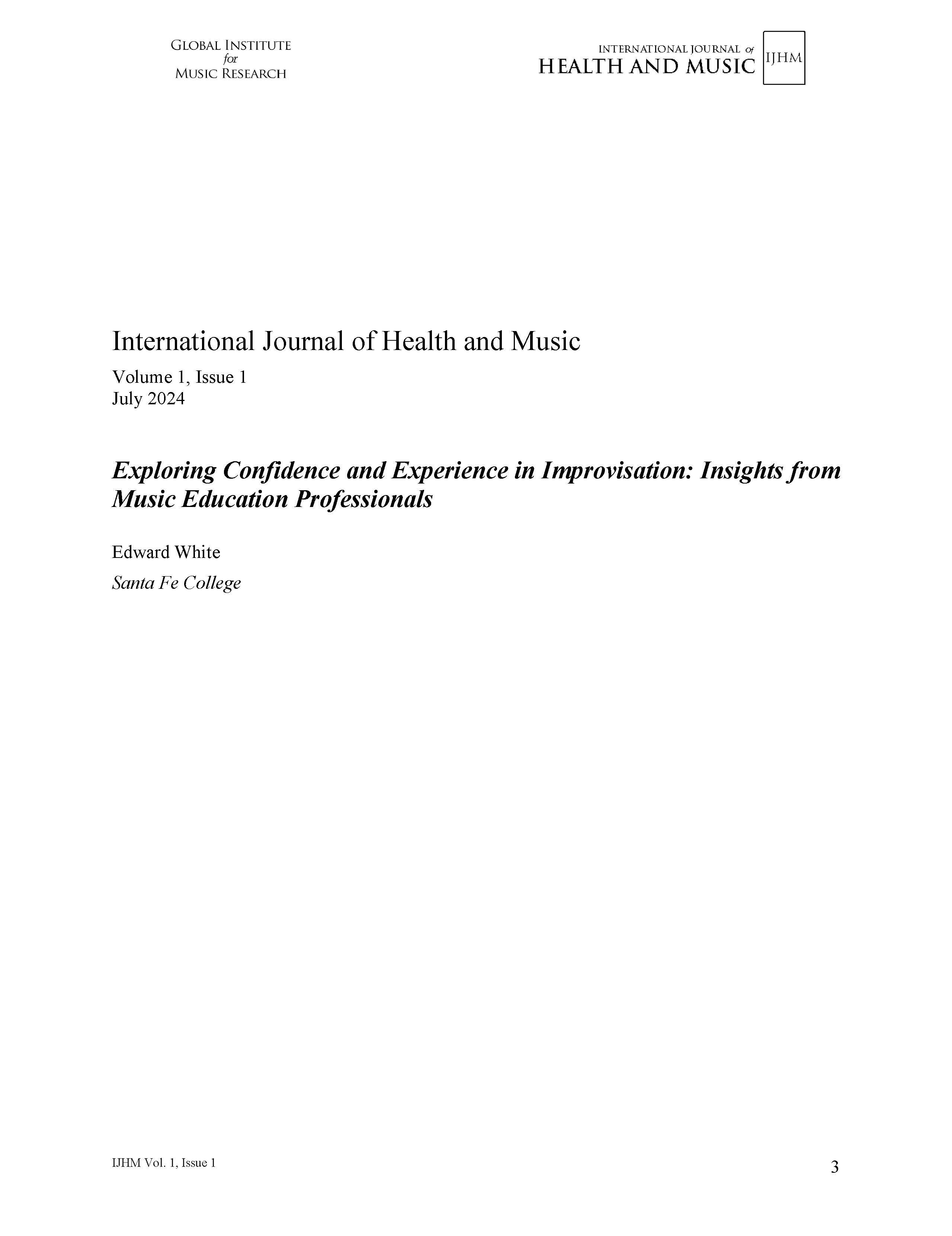Exploring Confidence and Experience in Improvisation
Insights from Music Education Professionals
DOI:
https://doi.org/10.61629/ijhm.v1i1.40Keywords:
college, improvisation, music education, music major, undergraduateAbstract
This study examines the role of improvisation in music education and the challenges of integrating it into collegiate-level courses. Despite its significance in music learning, improvisation is often overlooked in school curricula. The research reveals a gap between the importance of improvisation and its limited presence in music education beyond jazz. The case study focuses on undergraduate music education students and addresses key research questions related to professors' perspectives, challenges in providing improvisational experiences, current implementation, and possibilities for further integration. Five participants, who are music professors specializing in music education, performance, and entrepreneurship, were interviewed, and observed. Data analysis identified primary themes, including confidence and experience, value, relevance, and time constraints as the main challenges to integrating improvisation. Further research will shed light on professors' views and the incorporation of improvisation in collegiate music curricula.
References
Azzara, C. D. (1993). Audiation-based improvisation techniques and elementary instrumental students' music achievement. Journal of Research in Music Education, 41(4), 328-342. https://doi.org/10.2307/3345508
Azzara, C. D. (1999). An aural approach to improvisation. Music Educators Journal, 86(3), 21-25. https://doi.org/10.2307/3399555
Baker, D. N. (1980). Improvisation: A tool for music learning. Music Educators Journal, 66(5), 42-51. https://doi.org/10.2307/3395775
Beckstead, D. (2013). Improvisation: Thinking and playing music. Music Educators Journal, 99(3), 69-74. https://doi.org/10.1177/0027432112467822
Bernhard, C. H. (2013). Music education majors ’confidence in teaching improvisation. Journal of Music Teacher Education, 22(2), 65-72. https://doi.org/10.1177/1057083712458593
Creswell, J. W., & Poth, C. N. (2018). Qualitative inquiry and research design: Choosing among five approaches (4th ed.). SAGE Publications, Inc.
Della Pietra, C. J., & Campbell, P. S. (1995). An ethnography of improvisation training in a music methods course. Journal of Research in Music Education, 43, 112-126. https://doi.org/10.2307/3345673
Hickey, M., Ankney, K., Healy, D., & Gallo, D. (2016). The effects of group free improvisation instruction on improvisation achievement and improvisation confidence. Music Education Research, 18(2), 127-141. https://doi.org/10.1080/14613808.2015.1016493
Hickey, M. (2009). Can improvisation be taught? A call for free improvisation in our schools. International Journal of Music Education, 27(4), 285-299. https://doi.org/10.1177/0255761409345442
Mertler, C. A. (2021). Introduction to educational research (3rd ed.). Sage Publications.
Palmer, C. M. (2014). Learning basic music theory through improvisation: Implications for including improvisation in the university curriculum. Music Symposium, 54. http://dx.doi.org/10.18177/sym.2014.54.sr.10844
Snell, II, A. H., & Azzara, C. D. (2015). Collegiate musicians learning to improvise. Bulletin of the Council for Research in Music Education, 204, 64-84. https://doi.org/10.5406/bulcouresmusedu.204.0063
Song, A. (2013). Music improvisation in higher education. College Music Symposium, 53. http://dx.doi.org/10.18177/sym.2013.53.sr.10308
Volz, M. D. (2005). Improvisation begins with exploration. Music Educators Journal, 92(1), 50-53. https://doi.org/10.2307/3400227
Ward-Steinman, P. M. (2007). Confidence in teaching improvisation according to the K-12 achievement standards: Surveys of vocal jazz workshop participants and undergraduates. Bulletin of the Council for Research in Music Education, 172, 25-50.
West, C. L. (2011). Teaching middle school jazz: An exploratory sequential mixed methods study (Publication No. 3459081) [Doctoral dissertation, The University of Michigan]. ProQuest Dissertation and Theses Global.

Downloads
Published
Issue
Section
License
Copyright (c) 2024 International Journal of Health and Music

This work is licensed under a Creative Commons Attribution-NonCommercial-NoDerivatives 4.0 International License.




